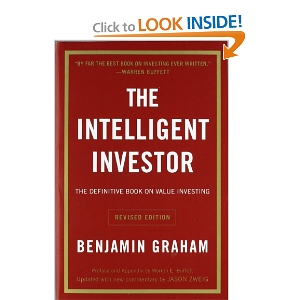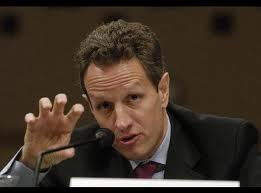I never intend Bankers Anonymous as a “How to invest” site,1 but B$A readers may safely approach The Intelligent Investor
as a “How Not to Invest” site, a more profitable set of rules in the long run, in my opinion. I prefer The Intelligent Investor to any modern investment book I’ve ever read, and I recommend it as inoculation against the investment advice crap that fills up bookstores, television, and the interwebs.
Since I started working in finance 15 years ago, acquaintances frequently learn about my background and start in with a “So what do you think of the market here?” or “What do you think of X stock?” The conversation typically gets awkward from there, as I mumble that fixed income markets are different from ‘the market’ they are asking me about and that I typically have no opinion whatsoever about particular stocks.
My professed ignorance is real, but The Intelligent Investor reminds me of why it’s best that I have no opinion. Benjamin Graham’s quick answer would be that security selection 2 is investing – rather than speculating – only if you have an idea about the value of the company you invest in. The company’s true value, in turn, would depend on knowing something about the cash flows which may be reasonably expected3 to accrue to the business you’re buying. Approximately 0.01% of the people4 asking my opinion about a particular stock have sought to value a company’s cash flows5 before making their purchase, or before asking my opinion. So what my acquaintance really is asking me is whether I prefer red or black at the Roulette wheel, or whether I hit or stay on 16 when the blackjack dealer is showing a 5. Frankly, I have no opinion, but it’s usually considered impolite to add that I’m pretty sure the house is going to win against you in the long run. So I try to stay quiet and mumbly.
Please allow me to justify my somewhat extreme response, as it’s contrary to everything most other financial professionals want you to believe, from the Motley Fool to the CNBC fool 6 whose primary parlor trick consists of reciting nonsensical facts he memorized about stocks just before the cameras started rolling. I don’t want to come off like a pretentious finance guy looking down my nose at amateur day traders. My real target here is not my day trading acquaintances, but rather the entire financial-infotainment-industrial complex, from CNBC to TD Ameritrade, from Goldman Sachs to Charles Schwab, which wants you to believe any or all of the following myths:
1. You can beat the market.
2. Your mutual fund manager can beat the market.
3. Jim Cramer7 can beat the market.
4. Your investment advisor can beat the market.
5. Your hedge fund guru can beat the market.
Although first published in 1949, very little of The Intelligent Investor feels dated. I estimate 95% of the opinions and techniques described by Graham still apply.8
Here’s a few rules of Graham’s approach that we all mostly honor in the breach, when investing:
- Investing in volatile markets requires not a timing approach, but rather a pricing approach. The entire financial-infotainment-industrial complex will guide you to the former, but investing according to value, when the stock dips into an attractive price range, requires knowing something about how to value a company, and something about the value of your particular target company. Trust me when I say neither Jim Cramer nor TD Ameritrade will help you in this process.
- You should receive investment advice with deep skepticism, whether it comes from your investment advisor, brokerage houses, investment firms, friends, or relatives. The best investment advisor is one who does two things: She prevents you from imprudent investment behavior, and she claims not brilliance but rather careful and conservative competence.
- New issues favor the seller, not the buyer, as the seller has the best access to information and almost by definition picks a favorable time to sell securities.9 Individuals should almost never seek to buy new issues.
- When deciding to purchase a stock, think like an owner, as that’s what you’ve become. Expect and hope to be treated by management like an owner. Realize, however – and this was as true in 1949 as it is today – that shareholder rights barely exist in practice.
- Be business-like in your investment practice. If you would not make professional decisions at work on a whim, based on emotion, or following a rumor you picked up from your gym-buddy, try to resist doing any of those things when making investments. If you approach investing as an amateur, do not expect profits like a professional, just as you would not in your day job. Businesslike investing for businesslike profits requires work, an idea which the financial-infotainment-industrial complex would like you to forget.
Benjamin Graham exposes the awful truth that very few of us can competently handle the work required to invest, rather than to speculate. Even worse, most investment advisors encourage the latter rather than the former.
Once you’ve absorbed this awful truth, what’s an ex-banker to do, you ask?10 I’ll paraphrase Graham and add my own editorial suggestions in the light of The Intelligent Investor:
- Hire an investment advisor, but pay them to keep you prudent and to deliver market results. As a logical consequence of this expectation, don’t overpay for investment advice.
- Expect market results. Do not expect to ‘beat the market.’11
- Markets can be volatile, and that’s not entirely a bad thing.12
- If you enjoy investing as a hobby, allocate some small part of your investible capital to your hobby, and expect to pay appropriately for that entertainment. Allocate the greatest portion of your investible capital to a low-cost investment vehicle, not managed by you, that fits your appetite for risk.
- Know your appetite for risk. For example, can you handle losing money? How much would you be able to lose without losing your head? Have you considered FDIC-guaranteed bank deposits as a result of thinking about this?
- Most people seek to highly diversity their investments, and rightly so. On the other hand, most people who become very wealthy in their own lifetime typically have extremely concentrated equity exposure.13 Are you someone who knows enough about owning your business(es) to be extremely concentrated in your equity investments?
Unlike The Motley Fool, I write Bankers Anonymous to “amuse and inform,” but not to give investment advice, or to “enrich.” Financial advice hasn’t improved much in the last 60 years, which is why The Intelligent Investor is where to begin if you’re looking for investment advice, and it might just be where to end as well.
Please see related post: All Bankers Anonymous Book Reviews in one place.
Post read (14001) times.
- It’s funny how many people, upon hearing my intentions with B$A, have said “So that’s just like The Motley Fool, right?” I’m not here to “Educate, Amuse & Enrich.” Just the first two, sorry. ↩
- I don’t mean to be jargon-y saying ‘security selection’ instead of ‘stock picking.’ I’m using ‘securities’ to mean stocks or bonds, and Graham refers to them both. ↩
- Allowing for Graham’s signature investing rule to always allow for a “margin of safety” ↩
- I rounded up that figure, fyi. ↩
- I’m saying cash flows here to mean either the income from a bond you own or the expected profits from the company that you own shares in. ↩
- Jim Cramer ↩
- Yeah, that guy with the clown squeaks, horns and whistles. Needless to say this brings to mind the great Jon Stewart take-down of Jim Cramer. ↩
- Oddly enough, interest rates have done a round trip since 1949, from 2.5% on the 10year to 16% and then back, such that his discussion on expected bond returns feels fresher than it probably would have 30 years ago. Kinda weird. ↩
- For a little more detail on my views of IPOs, can I interest you in this posting? ↩
- Last week I came across the best four pages of bullet-pointed investment advice and investment advisory advice I’ve ever seen assembled in one place. You’ll want to scroll down to Appendix 3, pages 9-12, of this attached PDF. If any of this blog post/book review speaks to you, you will love printing out those four pages and hanging them on your wall for future reference. I have zero connection to that author, and I had never heard of him before last week. You’re welcome. ↩
- Now is as good a time as any to acknowledge the weird and ironic truth that Graham’s best-known protégé, Warren Buffett, is the most famous market-beating investment manager of all time. When I read The Intelligent Investor, I get the strong sense that very few people will ‘beat the market,’ so I should not try it. But Buffett must have gotten the strong sense of the opposite: that through his efforts he would be one of the rare people who could beat the market. That’s just one of the small ways in which my life trajectory has differed from Buffett’s. ↩
- Graham means it in the sense that stocks sometimes get cheap, so volatility can be your friend. I mean it in another sense as well. In the post-Madoff era, we’ve learned that a consistent return with no down months does not mean your investment advisor is a genius, it means he’s a fraud. Remind me to tell you some time about my client who berated me for 20 minutes over the phone when he experienced the first down month in my fund. After a period of steady returns investing with me he had come to expect no down months, and suddenly I was “terrible at my job,” and he wanted his money back immediately. In a related news item, he found out by January 2009 that he had not just Madoff in his portfolio but 3 other Ponzi schemers as well. He was a lot sweeter to me after that. ↩
- The wealthiest man I’ve ever known, someone on the Forbes 400 list, told me when we first met that he’d never invested in the stock market. Most of his family’s net worth, however, derives from their ownership of a single successful retail business. That kind of concentrated equity exposure is typically a pre-condition of people who experience massive increases in wealth in their lifetime. Think Rockefeller, Gates, Jobs, and Zuckerberg.
These folks did not get wealthy through diversification, but rather the opposite. ↩










